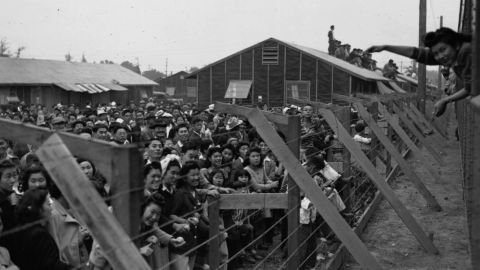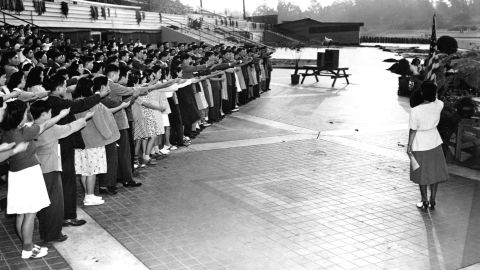Editor’s Note: Lynda Lin Grigsby is a journalist and editor who has written for a number of national news outlets. She is a former editor of the Pacific Citizen, a national Asian American newspaper. The views expressed here are her own. Read more opinion at CNN.
CNN
—
February 19, 1942 changed everything for Japanese Americans.
The curves and flourishes of President Franklin D. Roosevelt’s signature that day on Executive Order 9066 precipitated the forced removal and incarceration of Japanese Americans during World War II, sealing the fate of over 125,000 people. Their mass incarceration, often referred to as one of our nation’s most shameful chapters, is remembered every February 19th as the “Day of Remembrance.”
In the aftermath of the Pearl Harbor attack, Americans of Japanese ancestry were singled out in bold, all-cap font, and ordered to leave their homes and businesses on the West Coast under the pretext of national security. Entire families were incarcerated in horse stalls at racetracks and austere government-run barracks behind barbed wire fences, held as human collateral of wartime hysteria.
This year, on the 81st anniversary of the signing of Executive Order 9066, Japanese American community groups will mark the Day of Remembrance with somber events, and politicians will issue statements filled with aphorisms about how learning about the painful parts of our history can prevent us from repeating it.
That’s all great, but perhaps not nearly enough.
Remembrance is an important foundation to understanding, but its limitation is outlined in its name. The act of remembering keeps us rooted in the past and could foster a belief that events like these could only happen in the black-and-white photographs.
But the same legal framework used to justify the WWII incarceration of Japanese Americans still exists today, so it can happen again to any group of people. The Non-Detention Act of 1971 prohibits the military detention of US citizens, except by an act of Congress. Presumably, this was a step forward from 1942 when the decision was made solely by the president, but the power of our federal government to order the military to detain American citizens en masse remains authorized by an existing law.

So, on a day set aside to remember the plight of Japanese Americans during WWII, how do we meaningfully acknowledge what happened and ensure that something like this does not happen again? The answer may lie in a bill that has failed to pass since 2017.
The Korematsu-Takai Civil Liberties Protection Act, would establish clear legal prohibition against incarcerating Americans based not only on race, religion, and nationality but also sex, gender identity, sexual orientation, ethnicity or disability. The bill seems like a slam dunk – a way to speak truth to power when we say, “Never again.”
The bill is named after Fred Korematsu, a civil rights icon who challenged the constitutionality of the mass incarceration all the way to the Supreme Court, and Rep. Mark Takai of Hawaii. Both men have died since the measure was first introduced.
It takes the lessons of this historic event and extends it to protect additional marginalized groups. Isn’t that what it means to prevent history from repeating itself? To repair our country’s wounds, we must go beyond remembrance and take meaningful action with the lessons of the past.
“It’s a more forward-looking commitment,” Eric Muller, a law professor at the University of North Carolina, told me when we discussed the legislation recently. “It’s an opportunity to take this tragic historical example and have it be something more than just a tragic historical example. We could have it be something that actually leads to a more just world for current and future generations.”

This is a sentiment that I hear often from survivors and descendants of the WWII camps. For years, I bore witness to their stories as an editor of a national Asian American newspaper. The internalized message of the government’s action against the Issei and Nisei (first- and second-generation Japanese Americans) sublimated trauma.
Often, the effects of the mass incarceration quietly span over generations, bubbling to the surface in fits of tears, anger, or resolve in the grown children and grandchildren of the camps.
In 1942, Yetsuko Saguchi and her twin sister Kaz Tanaka were 3 years old when their family was forced by government order to abandon their farm and home in Artesia, California. When Japanese Americans were instructed to bring only what they could carry, their mother, Shizuko Hamamoto, only carried belongings for her daughters. First, they lived in the horse stalls at the Santa Anita racetrack, and then in the skeletal barracks in Rohwer, Arkansas.
“I’m not bitter,” Saguchi, 83, told me recently during an interview. “This happened, but my concern is that it never happens to another group.”
She has good reason to worry: In the days after the September 11, 2001 attacks, US government officials rounded up South Asian and Arab men for questionable detention. In this news, Saguchi heard echoes of her past, so she started talking about her family history to anyone who would listen. “It’s unjust, and it’s just wrong,” said Saguchi. “You can’t treat your fellow humans that way.”
For this reason, the Korematsu-Takai bill should be a no-brainer, because it is based on a historic event that many agree was unjust. After the passage of the Civil Liberties Act in 1988, the US government officially apologized and paid reparations for its wartime actions against Japanese Americans.
The need for our leaders to prevent future mass detentions based on race and other marginalized identities is one of the imperative lessons of our past. The bill’s passage seems far more meaningful than symbolic gestures or commemorative events. Instead of just saying we should learn from our history, we can turn words into action. But we must ask ourselves first if we are ready to look forward.